|
|
|
Sort Order |
|
|
|
Items / Page
|
|
|
|
|
|
|
| Srl | Item |
| 1 |
ID:
068363
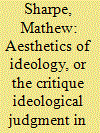

|
|
|
| 2 |
ID:
132170
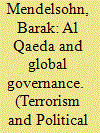

|
|
|
|
|
| Publication |
2014.
|
| Summary/Abstract |
In recent years, statements by al Qaeda leaders have included references to topics often associated with global-governance proponents' critique of the state. This article examines the organization's attitude toward symbols of global governance, giving particular attention to its view of the United Nations as the foundation for global governance, and to the manner in which al Qaeda approaches the central questions of environmental threats and human rights. The organization is seeking to insert itself into the discourse of global governance and use it in an instrumental manner; it focuses on anti-Western narrative and seeks to expose the existing order as designed by Western powers, particularly the United States, for self-serving reasons. However, the article argues, notwithstanding al Qaeda's reputation for sophistication in manipulating public opinion, the organization's references to global governance underscore the limitations its rigid ideology imposes on its messaging efforts. Even though adopting the global governance discourse is in line with the group's effort to improve its image, al Qaeda's extremist ideology limits its ability to take full advantage of the benefits this discourse offers.
|
|
|
|
|
|
|
|
|
|
|
|
|
|
|
|
| 3 |
ID:
079273
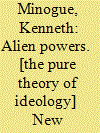

|
|
|
|
|
| Publication |
New Brunswick, Transaction Publishers, 2007.
|
| Description |
xxxvii, 358p.
|
| Standard Number |
0765803658
|
|
|
|
|
|
|
|
|
|
|
|
Copies: C:1/I:0,R:0,Q:0
Circulation
| Accession# | Call# | Current Location | Status | Policy | Location |
| 052673 | 320.5/MIN 052673 | Main | On Shelf | General | |
|
|
|
|
| 4 |
ID:
132298
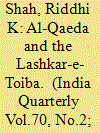

|
|
|
|
|
| Publication |
2014.
|
| Summary/Abstract |
Study of ideology is one of the most important domains of consideration for a successful counter-terrorism strategy. It is necessary to know and understand the ideology of a terrorist outfit coupled with the ongoing evolution at the same, its chief ideologues and its target audiences in order to provide an alternative ideology or in other words to win the 'hearts and the minds' of the people. This article traces the mounting similitude in the discourse and the actions of Lashkar-e-Taiba and the ideology of Al-Qaeda. The article begins with a brief depiction of the debate on the 'end of ideology' before proceeding on to an examination of Al-Qaeda's ideology. In the next section, LeT's discourse and actions from 1990 to 2010 are scrutinised followed by an analysis that attempts to draw out parallels between the ideologies of the two terrorist organisations. In the last section, the conclusion raises several pertinent points for the consideration of counter-terrorist specialists and policy makers.
|
|
|
|
|
|
|
|
|
|
|
|
|
|
|
|
| 5 |
ID:
168785
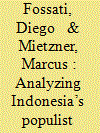

|
|
|
|
|
| Summary/Abstract |
Using original survey data, we test the level, distribution, and demographic patterns of populist attitudes in Indonesia. Populist attitudes are widely spread across the political spectrum; disproportionately high in the middle and upper classes; and particularly robust when coupled with other primary ideologies, such as Islamism and secularism.
|
|
|
|
|
|
|
|
|
|
|
|
|
|
|
|
| 6 |
ID:
099483
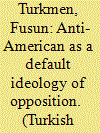

|
|
|
|
|
| Publication |
2010.
|
| Summary/Abstract |
Contemporary anti-Americanism is as much based upon a backlash against globalization and an antithesis to the values generated and exported by American culture as on specific episodes of contention between the US and another collective actor, altering the nature of their relationship in the long run by determining the subsequent behavior of the politically dominant actors as they remain engraved in collective memory. On the basis of this assumption and following an overview on anti-Americanism as a phenomenon, this essay analyzes the recurrent anti-Americanism in Turkey, identifying its external and internal sources-that is, episodes of contention and other factors such as ideology, nationalism and the role of the media-as well as its consequences, before replacing it within the typology elaborated by Peter J. Katzenstein and Robert O. Keohane on various anti-Americanisms.
|
|
|
|
|
|
|
|
|
|
|
|
|
|
|
|
| 7 |
ID:
181928
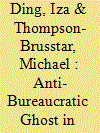

|
|
|
|
|
| Summary/Abstract |
The Chinese Communist Party's (CCP) ideology, rooted in its foundational struggles, explicitly denounces “bureaucratism” (guanliaozhuyi) as an intrinsic ailment of bureaucracy. Yet while the revolutionary Party has blasted bureaucratism, its revolutionary regime has had to find a way to coexist with bureaucracy, which is a requisite for effective governance. An anti-bureaucratic ghost thus dwells in the machinery of China's bureaucratic state. We analyse the CCP's anti-bureaucratism through two steps. First, we perform a historical analysis of the Party's anti-bureaucratic ideology, teasing out its substance and emphasizing its roots in and departures from European Marxism and Leninism. Second, we trace both the continuity and evolution in the Party's anti-bureaucratic rhetoric, taking an interactive approach that combines close reading with computational analysis of the entire corpus of the People's Daily (1947–2020). We find striking endurance as well as subtle shifts in the substance of the CCP's anti-bureaucratic ideology. We show that bureaucratism is an umbrella term that expresses the revolutionary Party's anxiety about losing its popular legitimacy. Yet the substance of the Party's concern evolved from commandism and revisionism under Mao, to corruption and formalism during reform. The Party's ongoing critiques of bureaucratism and formalism unfold in parallel fashion with its efforts to standardize, regularize and institutionalize the state.
|
|
|
|
|
|
|
|
|
|
|
|
|
|
|
|
| 8 |
ID:
155209
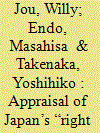

|
|
|
|
|
| Summary/Abstract |
The conservative Liberal Democratic Party won overwhelming victories in the 2012, 2013, 2014, and 2016 elections in Japan. We discuss whether this reflected a rightward shift in the electorate, by examining how major parties and leaders are identified with particular ideological poles, and citizen–government distance on a range of issues.
|
|
|
|
|
|
|
|
|
|
|
|
|
|
|
|
| 9 |
ID:
159881
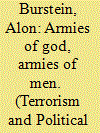

|
|
|
|
|
| Summary/Abstract |
This article compares the violent activity of secular and religious terror organizations. Utilizing data compiled by the Global Terrorism Database cross-referenced with secondary and primary sources regarding the degree of religious components embedded in organizations’ ideologies, it tests the violent patterns of activity carried out by organizations guided by predominantly secular, secular/religious, and religious ideologies, between the years 1970 and 2012. The findings confirm that a) religious ideology correlates with specific, more deadly, attack tactics and violent patterns; and b) the degree of religious components within terror organizational ideology should be tested along a spectrum: the more religious an organization is, the more attacks it tends to carry out, and the deadlier its attacks become.
|
|
|
|
|
|
|
|
|
|
|
|
|
|
|
|
| 10 |
ID:
184443
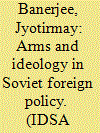

|
|
|
| 11 |
ID:
186319
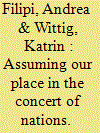

|
|
|
|
|
| Summary/Abstract |
Pierre Nkurunziza died in 2020, just a few months short of completing his tenure as the first post-civil war President of Burundi. Critics have cast him as yet another rebel-turned-politician who came to office on a promise of a democratic transformation but became progressively authoritarian, particularly during his third, disputed term in office. As a political figure, however, Nkurunziza remains poorly understood. What kind of a worldview motivated his politics? Drawing on critical discourse analysis, we identify three recurring themes in Nkurunziza's key political speeches: anti-colonialism; unity and self-sufficiency; and discourse around ‘politics of a new beginning’. These themes were stable across time, indicating Nkurunziza's consistent worldview, but became more pronounced and radical as he faced growing challenges to his legitimacy from within and without. Far from being confined to rhetoric, the themes also manifested in concrete policy decisions, underscoring the urgent need to take ideology seriously in understanding the political trajectories of African leaders.
|
|
|
|
|
|
|
|
|
|
|
|
|
|
|
|
| 12 |
ID:
148157
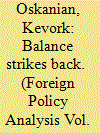

|
|
|
|
|
| Summary/Abstract |
Tbilisi’s recent foreign policy presents analysts working from a balance-of-power perspective with something of a puzzle: with Russia very much the regionally dominant power, against the predictions of structural-systemic theories, small state Georgia has ended up balancing against, rather than bandwagoning with, great power Moscow. As a result, domestic, ideological explanations that implausibly ignore or minimize interstate considerations of power have predominated in analyses of Tbilisi’s foreign policy. In response, this essay examines Georgia’s post-Soviet foreign policies from a neoclassical realist theoretical viewpoint, combining systemic, balance-of-power and domestic ideological factors: throughout the period under review, Tbilisi’s policies were thus due to ideologically conditioned perceptions of shifting power-political realities in its neighborhood, with an ideological adherence to liberal norms playing a particularly important role in distorting these perceptions during the Saakashvili administration. Through this combination of power and ideology, neoclassical realism ends up providing a more comprehensive and continuous account of Tbilisi’s shifting policies since 1992 than either domestic or alternative realist frameworks, like balance-of-threat theory, or omnibalancing; as an important implication, Georgia’s, and other former Soviet states’ continued pro-Western orientation will depend as much on their perceptions of the West’s continued commitment to regional power projection as on domestic ideological preferences.
|
|
|
|
|
|
|
|
|
|
|
|
|
|
|
|
| 13 |
ID:
138246


|
|
|
|
|
| Summary/Abstract |
The Battle of Gökdepe (1881) is considered to be a turning point in Turkmenistan’s contemporary historiography. It led to the then independent Turkmen (Akhal Tekke in this case) tribes coming under Russian control. Almost immediately after the event the battle became a controversial point of interpretation starting from Turkmen sources (rarely known to us), an immense number of Russian (mostly military) sources, up to the Soviet historians. The post-Soviet official Turkmen historiography of the event came from these foundations, but used its own mythological approach. As a result, the contemporary narrative of the Gökdepe defeat turned into a victory for the Akhal Tekke (and broadly Turkmen) nation. Additionally, this paper argues that the first and partly the second presidents of Turkmenistan incorporated the battle into their own personality cults, a fact which is still specific to the Central Asian context, albeit not unique in world history. In particular, the first president usurped the myth and connected it with his own historical narrative. The second president continues this in the frames of the already settled political culture in the country, adapting the Gökdepe myth to create his own ideological story. Therefore, the appropriation of the historical event in Turkmenistan represents a specific (albeit not unique) case of this kind and shows the way of thinking about the leader in current Turkmenistan.
|
|
|
|
|
|
|
|
|
|
|
|
|
|
|
|
| 14 |
ID:
032002
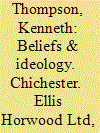

|
|
|
|
|
| Publication |
Chichester, Ellis Horwood Ltd, 1986.
|
| Description |
135p.
|
| Standard Number |
0853128588
|
|
|
|
|
|
|
|
|
|
|
|
Copies: C:1/I:0,R:0,Q:0
Circulation
| Accession# | Call# | Current Location | Status | Policy | Location |
| 027474 | 306/THO 027474 | Main | On Shelf | General | |
|
|
|
|
| 15 |
ID:
188816
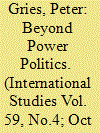

|
|
|
|
|
| Summary/Abstract |
A growing literature demonstrates that ideology shapes international relations. But just how does ideology have its effect? This article develops an integrated model of mediators and moderators of the impact of ideology on foreign policy. Specifically, it hypothesizes that ideologically motivated perceptions of threat and national power sequentially mediate the impact of individual-level ideologies on foreign policy preferences, and that in/out-group social categorization processes moderate the relationship. We interrogate these propositions with three plausibility probe case studies. The conclusion discusses which aspects of the model were best supported by the plausibility probes—and suggests hypotheses for future causal testing.
|
|
|
|
|
|
|
|
|
|
|
|
|
|
|
|
| 16 |
ID:
171000
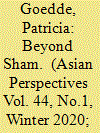

|
|
|
|
|
| Summary/Abstract |
The Constitution of the Democratic People's Republic of Korea is often dismissed as a valid legal instrument within the larger framework of the North Korean legal system. This is an unsurprising outcome given the portrayal of North Korea as a totalitarian dictatorship, documented human rights abuses, and the lack of access to the country's lawmaking processes. It is also a foreseeable result if comparisons are made to liberal democratic constitutions where rights guarantees and judicial review are defining elements. However, the North Korean Constitution deserves more nuanced scrutiny in light of evolving research on socialist and authoritarian constitutionalism in Asia. This article argues that the DPRK Constitution should be included more substantively within the analytical frameworks of Asian, socialist, and authoritarian constitutionalism by virtue of how it functions to nation-build, legitimate institutional leadership, signal ideological shifts, regulate society on collectivist, duty-based principles, and guide economic reforms for development and modernization.
|
|
|
|
|
|
|
|
|
|
|
|
|
|
|
|
| 17 |
ID:
077214
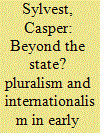

|
|
|
|
|
| Publication |
2007.
|
| Summary/Abstract |
The relationship between pluralism and internationalism is an interesting historical theme on the borderline between international relations and political theory. Intuitively the two ideologies seem to enjoy a close relationship, and at an abstract level they were both concerned with achieving political order with a minimum of central authority. However, the historical and theoretical interconnections between pluralism and (liberal) internationalism in Britain remain largely unexplored. This article attempts to fi ll this lacuna in intellectual history. Although both took shape within the confines of the same progressive intellectual agenda, the article strikes a cautious note about establishing too close a link between pluralism and internationalism, especially in the years following the Great War. This sceptical conclusion reflects not only the different preoccupations and changing nature of both pluralism and internationalism in the opening decades of the twentieth century, but also their complex theoretical relationship.
|
|
|
|
|
|
|
|
|
|
|
|
|
|
|
|
| 18 |
ID:
126156
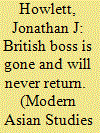

|
|
|
|
|
| Publication |
2013.
|
| Summary/Abstract |
In May 1949 the Chinese Communist Party seized Shanghai. Rather than being elated at the prospect of harnessing the economic power of China's largest city to complete the revolution, the Communists approached it cautiously. How would the Chinese Communist Party set about transforming this free-wheeling port city with a 'semi-colonial' past into an orderly and socialist city? How would it balance ideology and pragmatism in reshaping Shanghai? This paper uses the takeover of two British companies as case studies to explore these issues at the ground level. It is argued that the means by which these companies were transformed tell us much about the Party and its state-building policies. When cadres entered foreign companies, their priority was not radical change and anti-imperialism, but rather fostering a sense of stability and unity to avoid disrupting production. Their gradual approach was due in large part to the Party's awareness of its own limited skills, resources and manpower, but also to its leaders and cadres recognizing that before they could remake Shanghai anew they had first to deal with the material and human legacies of the past.
|
|
|
|
|
|
|
|
|
|
|
|
|
|
|
|
| 19 |
ID:
166667
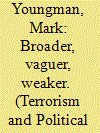

|
|
|
|
|
| Summary/Abstract |
In October 2007, veteran Chechen field commander Dokka Umarov proclaimed the formation of the Caucasus Emirate (IK), formalising the victory of the North Caucasus insurgency’s Islamist wing over its nationalist-separatists. During Umarov’s time as leader, the North Caucasus experienced sustained violence and the IK claimed responsibility for multiple terrorist attacks in and beyond the region. However, despite the importance of ideology in understanding insurgent behaviour, the IK’s ideology and Umarov’s role in shaping it remain understudied. Using Social Movement Theory’s concept of framing to analyse Umarov’s communiqués throughout his lengthy tenure (June 2006–September 2013), this article identifies three distinct phases in Umarov’s ideological positioning of the insurgency: nationalist-jihadist (June 2006–October 2007); Khattabist (October 2007–late 2010); and partially hybridised (late 2010–September 2013). The article contributes to debates over typologies of jihadist actors by highlighting the difficulties in applying them to the North Caucasus and provides a clearer understanding of the IK’s ideological transformation and the limits to its engagement with external actors. The article also illustrates that weakness was a key factor in explaining that transformation and identifies several avenues for research that could further enhance our understanding of the IK’s ideology and the role it plays.
|
|
|
|
|
|
|
|
|
|
|
|
|
|
|
|
| 20 |
ID:
126511
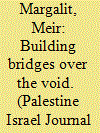

|
|
|
|
|
| Publication |
2012.
|
| Summary/Abstract |
After more than 45 years of occupation, the impact of nonviolent movements on Israeli society is still difficult to assess, and therefore their effectiveness is difficult to evaluate. The failure of all efforts aimed at ending the occupation is now clearer than ever, although, and this is remarkable, the fight against the system supporting this status quo has never declined. Despite this tireless activism, it remains unclear whether these nonviolent efforts have meaningfully contributed to peace or whether they have proved largely irrelevant to domestic and regional policies.
Not only do we lack convincing answers, but the answers we do have also differ depending on external circumstances. In bleak times, as during the Second Lebanon War, Operation Cast Lead and both intifadas, activist movements often feel useless. In contrast, during more encouraging times, such as the immediate aftermath of U.S. President Barack Obama's election, the feelings tend to be more positive and optimistic. This may be a defining issue among dissidents in Israel: shifting views without knowing what tomorrow has in store for them, going against the current within an uncertain environment.
|
|
|
|
|
|
|
|
|
|
|
|
|
|
|
|
|
|
|
|
|